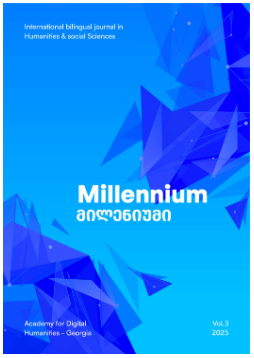Corpus Linguistic Analysis of Aphorisms in “The Knight in the Parter`s Skin” (A Comparative Study of the Translations into Russian and Ukrainian)
Main Article Content
Abstract
his article presents a corpus-linguistic analysis of aphoristic expressions in the Georgian national epic The Knight in the Panther’s Skin by Shota Rustaveli and examines its translations into Russian and Ukrainian. The methodological approach is based on the “Rustaveli goes digital” project, particularly its method of phrase alignment. The analysis of the relationships between the Georgian original and the translations draws on the equivalence classification model by Henjum and Koller as well as on concepts from cognitive semantics. In addition, the phenomenon of the aphorism is examined in detail and theoretically defined. For the empirical study, six aphorisms were selected as examples. Three one-line and three two-line aphorisms were analyzed in order to account for expressions of varying length. In addition, the contextual embedding of these statements within the narrative structure of the epic was examined. The analysis reveals notable differences in translation strategies, especially with regard to information structure and rhetorical devices. While both translations largely preserve the universal and argumentative character of the aphorisms, the Ukrainian version shows greater lexical proximity to the Georgian original but often exhibits more profound structural changes. The Russian translation, by contrast, remains structurally closer to the source text but shows stronger semantic deviations. The results highlight the complexity of translating aphorisms and underscore their potential as objects of linguistic and translation-focused analysis.
